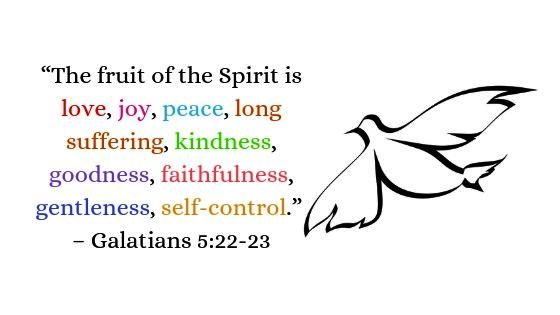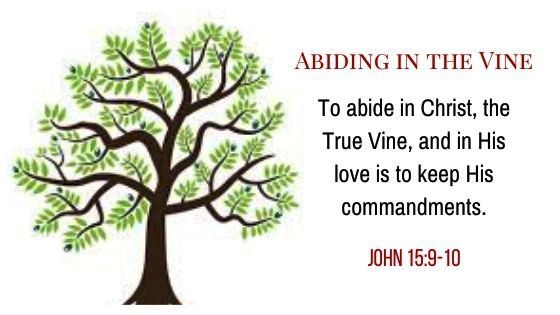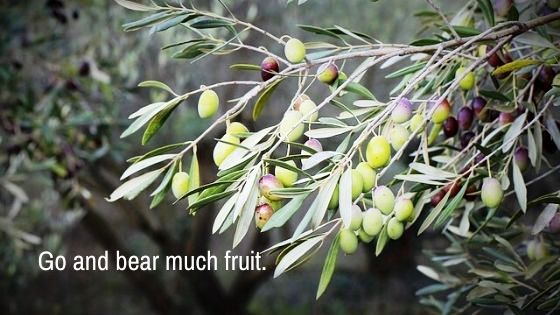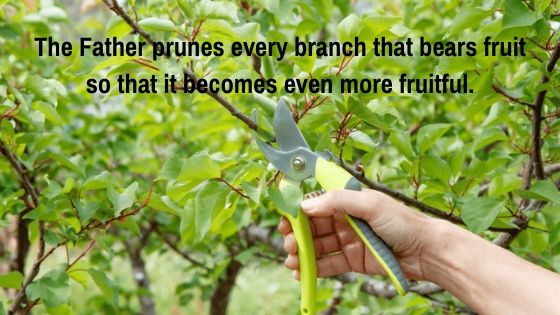In the creation story, the very first command given to man by God was “to be fruitful and increase in number” (Genesis 1:27-28). Interestingly, Jesus gave the same command to His followers in John 15:16: “to go and bear fruit – fruit that should remain” (or that will last).
But what fruit (or fruits) is Jesus referring to in this passage? What does it mean for a believer to be fruitful? And how are Christians supposed to bear fruit?
The Believer’s Fruit
There are three kinds of fruits that the passage can be referring to: the fruit of the Spirit, the fruit of our labor and our good works.
1. The Fruit of the Holy Spirit
Whenever the Bible speaks of fruit or being fruitful in Christ, it is often in reference to the fruit of the Holy Spirit operating in the life of a believer: love, joy, peace, longsuffering (patience), kindness, goodness, faithfulness, gentleness, and self-control (Galatians 5:22-23).

Notice that these fruits are attributes of God-like love, peace, faithfulness, and goodness. It is expected that these fruits will closely resemble the parent plant, which in this case is the Spirit of God. While it is true that we cannot see in the human heart to know who is truly born again and who is not, we can see the fruit of a person’s life or the absence thereof.
A person who is truly saved and belonging to Christ, having already crucified the flesh with its passions and desires, is now living according to the Spirit. And if he is living according to the Spirit then he is also walking according to the Spirit, thereby making the fruits of the flesh less visible (Galatians 5:24-25).
2. The Fruit of His Labor
Before Jesus ascended to heaven, He gave this command to His disciples: “Go therefore and make disciples of all the nations, baptizing them in the name of the Father and of the Son and of the Holy Spirit, teaching them to observe all things that I have commanded you” and He promised, “I am always with you to the end of the age” (Matthew 28:19-20).
This mandate is not only for the eleven disciples of Jesus but for every believer in Christ. When we share our faith with others and they respond by acknowledging their sinfulness and accepting Jesus as Lord and Savior of their lives, they become our fruit.
How many persons have come to the saving knowledge of Jesus Christ because you cared enough to share the gospel message?

3. The Fruit of Good Works
The good works that the believer does can also be counted as fruits. When you show even the simplest acts of kindness to Christians and non-Christian alike that you come in contact with, extend a helping hand to those in need or share your time and talent (money) in support of your church ministry, you are bearing the fruit of good works.
However, I need to emphasize the cardinal biblical truth that good works do not have any bearing on our salvation. We have been saved by grace through faith alone in the Lord Jesus and this is not from ourselves. Salvation is the gift of God, not by our works so that none of us can boast (Ephesians 2:8-9).
The good works we do are fruits of our salvation. In other words, they are evidence of our genuine faith, which is what is needed to receive God’s gift of salvation. This is actually what James is pointing out in his epistle when he said, “Faith without action is dead” (James 2:14-26).
We do not have to prove to God that our faith is genuine; He knows because He sees our hearts. But our good works will prove to others that we are truly saved and we belong to Christ. (2 Corinthians 5:17).

The Fruitful Life: Abiding in the Vine
If we read the entire passage wherein Christ appointed His followers to be fruitful, He specifically said that the only way they could carry out this task was for them to abide in Him (John 15:1-10). What does it mean to abide in Christ?
The fact that the word “abide” is mentioned eight times in seven verses (John 15:4-10) strongly points out how the branch cannot produce its own life; it must draw that life from the vine. In other words, it is crucial to abide in Christ if we are to live a fruitful Christian life.
Note: And if you’re reading from the New International Version, the word “remain” is mentioned eleven times (John 15:4-10 NIV).
After Jesus announced to His disciples that He would be leaving them soon and promising the Holy Spirit to abide with them forever, we now come to the seventh and last of the “I am” statements of Christ recorded in the gospel of John.
As Jesus spoke to His disciples probably in the upper room, preparing to leave, He uses the imagery of a vine to describe the new relationship which His disciples are about to enjoy with Him and with the Father. Our Lord is the vine; the believers are the branches, and the Father is the vinedresser (gardener) who tends the vine, removing dead branches and pruning them so that they will become even more fruitful (John 15:1-2).
The Father Prunes
Our heavenly Father is never nearer to us than when He is pruning us. Sometimes He cuts away the dead wood that might cause trouble, but often He cuts off the living tissue that is robbing us of spiritual vigor.
Pruning does not simply mean spiritual surgery that removes what is bad. It can also mean cutting away the good and the better so that we might enjoy the best. Yes, pruning hurts, but it also helps. We may not enjoy it, but we certainly need it.
At times the Father also prunes us (the branches) by allowing difficult circumstances and situations in our lives such as poor finances, poor health, misunderstanding and conflict with others, difficult relationships, etc. These trials are designed to bring us to the end of our own strength and will awaken in us a need for deeper surrender to the Lord.
*Read here: The Christian Response to Trials
Jesus Christ is the True Vine
Notice how Jesus speaks of Himself not merely as the “vine,” but as the “True Vine.” The vine was a familiar symbol in the Hebrew Scriptures for the nation of Israel (Psalm 80:7-8, 14-17; Isaiah 5:7; Ezekiel 19:10-14; Hosea 10:1-2). During the Maccabean period, they even adopted it as their national symbol.
However, the use of the vine as an image for the Jewish nation was often used in a negative sense (Ezekiel 15:1-8; 17:1-8; Jeremiah 2:21; Isaiah 5:1-2). The vine, which is the nation of Israel in the Old Testament, did not bear the fruit that God intended because of their unfaithfulness.
In contrast, Jesus is the True Vine, replacing the Jewish nation and Christians must be rooted in Him if they are to bear fruit for God. The vine and branch picture emphasizes complete dependence and the need for constant connection. Of itself, a branch is weak and useless. It is good for either bearing or burning, but not for building (John 15:5-6).
The Lord as the true vine is the source of life, strength, and fruit for the branches (believers). The branches obtain life through the vine; they are sustained by the vine and they produce fruit through the vine. The branches then become the visible manifestation of the life of the vine and God’s instruments for fruit-bearing.
Abiding in Christ: Living in Obedience
The abiding relationship is natural to the branch and the vine, but it must be cultivated in the Christian life. It is not automatic. Rather, it is something that we are commanded to do, and which takes effort and action on our part. To abide in Christ the true vine, demands worship, meditation of God’s Word, prayer, sacrifice, service, and above all, obedience to God and His Word.
Jesus made this very clear when He said, “As the Father loved Me, I also have loved you; abide in My love. If you keep My commandments, you will abide in My love, just as I have kept My Father’s commandments and abide in His love” (John 15:9-10). Simply put, to abide in Christ and in His love is to keep His commandments.
By the way, Jesus is not saying here that we abide in His love when we keep the Law. Jesus inseparably joins love and commandment keeping. This is evident when He summed up the Law by two commandments, both of which were commands to love in Matthew 22:34-40.
But when the Pharisees heard that He had silenced the Sadducees, they gathered together. Then one of them, a lawyer, asked Him a question, testing Him, and saying, “Teacher, which is the great commandment in the law?” Jesus said to him, “You shall love the Lord your God with all your heart, with all your soul, and with all your mind. This is the first and great commandment. And the second is like it: ‘You shall love your neighbor as yourself.’ On these two commandments hang all the Law and the Prophets.”
God gave His commandments out of love. What God prohibits, He prohibits for our own good. What God requires, He requires for our own good. God’s commandments are a manifestation of His love for us and He expects us to obey them out of our love for Him.
God’s laws or commandments should be the delight of every Christian because it is a manifestation of God’s love (Psalm 1:1-2). God gave us His commandments to keep us from those things that would destroy us and to point us to Jesus Christ – the One who can save us. So whenever we are tempted to look at God’s commands as something other than the expression of His love, we are headed for serious trouble.
And if we are looking for the best illustration of obedience, we must look no further for Jesus has exemplified the finest illustration of this kind of abiding with His total submission and obedience to the will of the Father (John 8:28-29).
Jesus never acted independently of the Father. In fact, He was completely obedient to the point of death, even the death of the cross (Philippians 2:8). Christ’s obedience made possible man’s reconciliation with God.

Conclusion
Living a fruitful Christian life is the calling for every believer. Not that we chose Jesus, the King of kings, but He chose us, He has called us to be His friends and appointed us to be fruitful (John 15:15-16). It is a humbling experience indeed!
And while it brings glory to the Father when the branches bear much fruit (John 15:8), the branches share in the joy of the vinedresser. The joy and satisfaction that go hand in hand with the bearing of more perfect and abundant fruit are not only reserved for the vinedresser, who is the Father but are shared by the branches as well.
Once again, the only way for believers to be fruitful in Christ is to abide in Him. It is our communion with Christ through the Spirit that makes possible the bearing of the fruit. The sooner we as believers discover that we are but branches, the better we will relate to the Lord, for we will know our own weakness and confess our need for His strength.
Are you bearing fruit for Christ to the glory of the Father in heaven?



Beautiful
Thanks for stopping by, Balogun.
God bless …
Great!